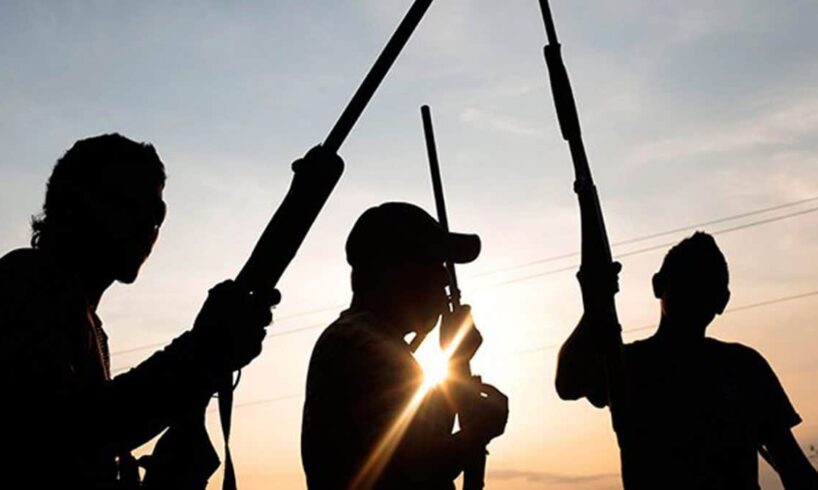
A vigilante leader and another vigilante member were killed on Wednesday when gunmen attacked Amakohia-Ubi, a community in Owerri West Local Government Area of Imo State, Nigeria’s South-east.
The incident, which occurred at about 6:30 p.m., forced many frightened residents to flee to neighbouring communities for safety.
A resident of the Amakohia-Ubi Community who identified himself simply as Mr Paul, told Vanguard newspaper that the vigilante leader, Monday Nwaozuzu, was shot dead during the attack.
“The dead, wounded, and missing persons are all members of our community vigilante group. Monday Nwaozuzu was killed by the herdsmen, while others are still missing or wounded. At least three members of the vigilante were caught up in the clash,” he said.
Another resident, who asked not to be named, explained that the trouble started when vigilante members tried to prevent herders and their cattle from entering farmlands around a school axis in the community.
“It is routine for our vigilantes to guard our farms. Yesterday (Wednesday), they encountered the herders and asked them to turn back, but they refused. Unknown to our men, the herders were fully armed.
“Suddenly, they opened fire, killing Monday and injuring another. Since then, we have been combing the bushes, searching for those missing,” the residents narrated.
The residents stressed they suspected that the attackers had abducted some vigilante operatives. They said that when some residents phoned one of the vigilante members on Thursday morning, a suspected herder picked up the call.
“For now, no one can say whether our brothers are dead or just abducted. This is not the first time our community has suffered such attacks in recent months,” he lamented.
Police speak
When contacted on Friday morning, the police spokesperson in Imo State, Henry Okoye, confirmed the attack to PREMIUM TIMES.
Mr Okoye, a deputy superintendent of police, said the vigilante leader and another vigilante member were shot by the bandits during the attack.
“But while one (the vigilante leader) died instantly, the other died while receiving treatment,” he said, without confirming the number of missing persons.
The spokesperson said the police in the state had begun an investigation into the incident and vowed that the attackers would be tracked down.
Herder-farmer conflict in Nigeria
A Nigerian senator, Ned Nwoko (APC-Delta), is pushing for a bill for the establishment, development and management of ranches across all 774 local government areas in Nigeria and the Federal Capital Territory to prevent the deadly herder-farmer clashes and enhance food security across the country.
Many Nigerians previously rejected a proposal for the Nigerian government to build ranches across various states in the country, while some states enacted laws banning the open grazing of cattle. But herders are still seen in some states roaming the roads and farmlands with their cattle.
“(Is) President Tinubu unaware that no sensible country in the world keeps cattle around its capital city?
“Let him point to any major city—from Nairobi to New Delhi, São Paulo to Seoul—where cattle are granted permanent settlements around central governance zones.
“This absurdity is uniquely Nigerian, and disgracefully so,” the outlawed Indigenous People of Biafra (IPOB) said in June, while rejecting President Bola Tinubu’s proposal to establish ranches in various states and Abuja.
IPOB is a group leading an agitation for an independent state of Biafra, which it wants carved out from the South-east and some parts of the South-south Nigeria.
The Nigerian government has repeatedly accused IPOB of being responsible for the deadly attacks in the South-east, but the group has repeatedly denied its involvement in the attacks.
Some IPOB leaders in the past have said that the group is meant to protect the South-east from herders.
Many have been killed and others displaced in the perennial clashes between nomadic herders and farmers, especially in the northern parts of the country, with one of the recent ones being the herders’ attack on the Aye-Twar community in the Katsina-Ala Local Government Area of Benue State on Sunday, 10 August.
PREMIUM TIMES reports that the attack, which spilt into the following day, left homes and worship centres in ruins, worsening the humanitarian crisis already weighing heavily on the displaced residents.
READ ALSO: Police confirm 10 killed in suspected herders attack in Ebonyi community
The Nigerian government, last year, inaugurated a committee to implement the Pulaku Initiative, a large-scale resettlement programme aimed at addressing the root causes of the conflicts and fostering national unity.
Vice President Kashim Shettima inaugurated the committee, chaired by the Minister of Housing and Urban Development, Ahmed Dangiwa, with the representatives of governors of the benefiting states as members.
The Pulaku initiative, meant to revitalise local communities through the construction of residences, roads, schools, and essential facilities, is initially focused on seven states that have been disproportionately affected by farmers-herders conflicts. They are Sokoto, Kebbi, Benue, Katsina, Zamfara, Niger, and Kaduna states.
Mr Shettima explained that the Pulaku resettlement is “a national commitment to confront a threat that has fuelled distrust and conflicts within communities and across the boundaries of our federation.”
“This non-kinetic solution is not designed to compensate any particular group or region. Therefore, we must cast aside any notion of divisive regionalism and see the Pulaku initiative for what it truly is—a practical response to a shared challenge,” he added.




